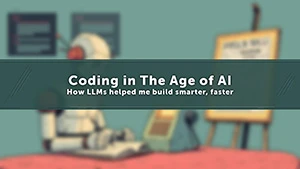
Image credit: Derivative image based on source from vwalakte on Freepik
Originally appeared in LinkedIn Future Singularity
Since the 1950s researchers have been chasing the dream of Artificial Intelligence (AI). Though the concept had been around for thousands of years, its earliest form was that of "automatons" or objects that were relatively self-operating. Fast forward to the early 1900s when scientists began to question if it were possible to create an artificial brain. It wasn't until the 1950s that the term "artificial intelligence" was coined by John McCarthy that the field began to grow. While great strides were made in the coming decades, the time of AGI, or the hunt for artificial general intelligence didn't take off until 2012. In recent years AI has been a transformative force across various industries, automating routine tasks and improving efficiency.
A significant shift is on the horizon as generative AI (gen AI) begins to reshape cognitively and creatively advanced jobs that, until now, seemed impervious to automation. While these roles are unlikely to vanish entirely, they will evolve, altering the skills valued in the marketplace and reshaping how we prepare the next generation of talent.
Understanding Gen AI
Gen AI is a mainstream subset of artificial intelligence that can perform specific tasks like creating text, images, or even code. Because it’s still limited to these specific tasks and can’t learn or reason like humans can across different areas it is known as narrow AI.
On the other hand, artificial general intelligence (AGI) is a theoretical concept where machines could match or exceed human intelligence and handle a wide range of tasks, not just specialized ones. Unlike gen AI, which is like a very advanced autocomplete, AGI would be able to truly understand context and learn from different experiences, similar to how the human brain works.
Gen AI is already very impressive, but it can't match the human ability to adapt and reason across various situations. AGI, which hasn’t truly been developed yet, would represent a huge leap forward, potentially transforming every industry and aspect of our lives in ways we can’t yet fully imagine.
The Impact on Creative and Cognitive Jobs
When we consider fields like writing and content creation, tools like OpenAI's ChatGPT and Anthropic's Claude already able to generate remarkably coherent articles, stories, and even poetry. This offers a shift in the role of writers from being lone creators to possibly becoming editors and curators of AI-generated content. The ability to refine and add a human touch to AI-produced text will become an increasingly invaluable skill.
Visual design has been impacted and transformed in a similar way. Gen AI can now create sophisticated visuals like website layouts, branded marketing materials, and photorealistic portraits. Instead of starting from a blank canvas, designers are able to adapt by integrating AI tools into their workflow and focusing more on higher-level creative direction and conceptualization. The AI handles the production labor, while human designers provide the guiding vision.
Put these together and we can see how the effects of AI impact fields like music, entertainment, and even Hollywood. Gen AI can compose soundtracks, write scripts, and generate synthetic virtual actors. Rather than being displaced, creative professionals in these fields will be able to pivot into more oversight roles. Which means they will be able to guide the AI system's output while infusing productions with the emotional depth and relatable human experiences that separate AI from true art.
Software developers and programmers are not immune to these AI-driven shifts either. AI coding assistants are becoming increasingly adept at writing, suggesting, and even debugging code. This may seem like an existential threat but could actually be a blessing in disguise. Developers can offload tedious routine coding tasks to AI systems, freeing up time and mental bandwidth for more complex challenges like software architecture design and integrating AI capabilities into production applications.
Thinking about the creative roles above, I would say that AI is not so much eliminating roles as it is redefining and elevating them. The technology can handle a lot of the laborious task work, providing powerful augmentation capabilities to your process. But the creative spark, emotional intelligence, and high-level strategic thinking to uplift and contextualize the outputs from AI into something moving and distinctly human? Those are the keys to enduring value that gen AI cannot provide on its own - at least not yet.
The Evolving Skill Set
As gen AI transforms these roles, the skills that hold value in the job market will also change. While gen AI can produce initial outputs like articles, designs, and code, refining and guiding that raw material into something purposeful and contextually relevant will require sharp human critical thinking and creative vision. Technical proficiency with AI tools is a must, but understanding their ethical implications and limitations is equally vital. The future workplace will hinge on seamless collaboration between humans and machines, demanding strong interpersonal and communication abilities.
Perhaps most importantly, an adaptable mindset centered on continuous upskilling will be paramount - the pace of technological change means the only constant is the need for lifelong learning to remain professionally relevant as entire skill categories are reshaped by AI year after year. A willingness to evolve and augment your own knowledge alongside AI systems will separate celebrated experts from obsolete roles.
Preparing the Next Generation
Education and training systems must evolve to prepare the next generation for this changing landscape. For example, incorporating AI education into the curriculum from an early age will ensure that students are familiar with these technologies and understand their applications, as well as their implications. Teaching students about the ethical implications of AI and the importance of responsible use will ensure that future generations prioritize ethical considerations in their work.
Fostering creativity and critical thinking should be a priority. Encouraging students to think outside the box and approach problems from multiple angles will prepare them for roles that require innovative solutions. Not to mention, by combining technical education with humanities and arts could lead to well-rounded individuals able to bridge the gap between AI capabilities and human needs. This interdisciplinary approach will help prepare them for roles that require both technical and creative skills.
Conclusion
As gen AI continues to advance, the future landscape of work will be characterized by a symbiotic relationship between humans and machines. AI will handle routine and repetitive tasks, while humans will focus on higher-order functions that require emotional intelligence, creativity, and complex problem-solving.
This transformation offers an opportunity to enhance productivity and innovation across industries. However, it also requires a proactive approach to managing the transition. By embracing the potential of gen AI and equipping ourselves with the necessary skills and knowledge, we can navigate this new era of work and unlock unprecedented opportunities.
The future of work is not about humans versus machines, but about humans working alongside machines to achieve greater heights than ever before.
Related
Why AI art will always kind of suck - If you look at art and all you see is content, that’s all you’ll get out of it. Human creativity can't be replaced by generative AI like ChatGPT, DALL-E, and Sora.
US intelligence agencies' embrace of generative AI is at once wary and urgent - Can AI predict global threats before they happen? The use of AI in intelligence is explored, from predicting the war in Ukraine to fighting the fentanyl crisis.
Amazon Alexa's next-gen upgrade could turn the assistant into a generative AI chatbot - likely for a fee. New reports provide insight into what the company aims to do with the upgraded Alexa, how much it may cost, and the reason why Amazon is doing this.


